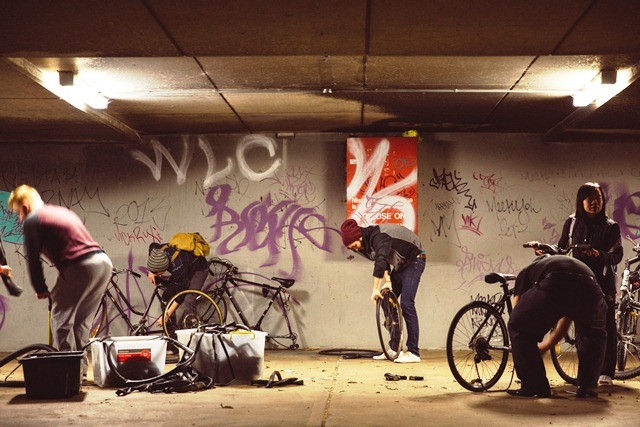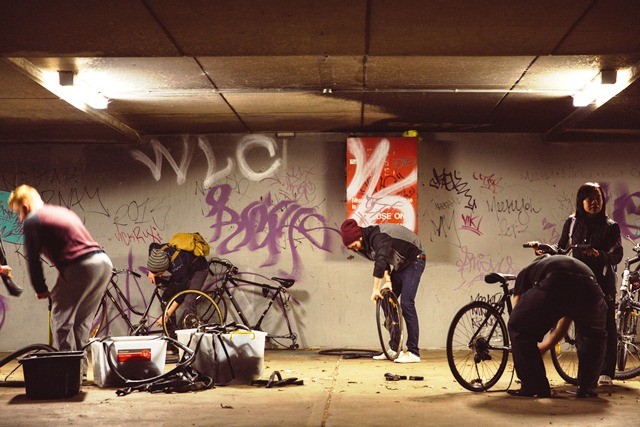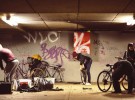 That old bike sitting in the museum of your life – your garage – could dramatically change someone’s life. Damian Antonio explains how your old bike can benefit yourself, your local community and the global community.
That old bike sitting in the museum of your life – your garage – could dramatically change someone’s life. Damian Antonio explains how your old bike can benefit yourself, your local community and the global community.
HERE ARE OVER A BILLION bicycles on the planet and 130 million more being produced every year. It is no surprise then that most cyclists have one, two…seven old bikes sitting around in their garages gathering dust and rust.
Rather than lamenting the gradually thickening layer of grime, what if you could put your old bike to good use?
What if you could help get five more bikes back on the roads in your local community? What if you could ensure an East Timorese student could get to school every day without walking two hours? Or if you could enable a Ugandan AIDS worker to get medicine to their patients?
Fortunately, Australia is now dotted with altruistic organisations that have discovered higher purposes for your old bikes. So what’s your best option? Well, that depends on how far-reaching you want the benefits to be.
PERSONAL BENEFIT
One way to benefit from your old bike is to use it to improve your bicycle repair and maintenance skills. Treat it like a medical student treats a cadaver: a tool for learning and understanding; knowing that if you accidentally remove this organ or cut that nerve, it’s okay because they’re already dead.
The best way to understand the inner workings of any mechanical part – whether a human heart or a wheel hub – is to take it apart. It is only then that abstract problems, such as cracked ball bearings and pitted cones, become easily diagnosable and solvable.
Sure, the first time you dissect your hub, there’s a good chance you’ll end up with ball bearings scattered to every corner of the garage. The second time you’ll carefully remove them with your fingers and only three will bounce into oblivion. And the third time maybe you’ll put a towel down to ensure that none escape.
Being a good bicycle mechanic is all about experience and repetition – that is, the experience of repeatedly making mistakes – and it’s much better to do that on your old bike than the one you’re supposed to be racing on the weekend.
LOCAL COMMUNITY BENEFIT
If you want to expand the benefits of your old bike beyond your own garage, why not put your bike – or at least parts of it – back into your local community? It might mean that your neighbour now has a free and healthy way to get to work. It might mean one less car on the road during your daily commute. Most importantly, it will mean you have increased the influence of your tribe: the cycling community. This can be important when it comes to raising awareness for cyclists’ safety and increasing political influence for cycling infrastructure.
If this sounds like your old bike’s destiny, the good news is that you don’t have to go knocking door-to-door, asking your neighbours if they want your old derailleur or kickstand. Social initiatives sprouting up all over Australia have made injecting your old bike back into your community easier than ever before. One of these is Cycle Re-Cycle Club in Sydney.
Cycle Re-Cycle Club is a repository of spare parts, tools and knowledge. The club’s small group of dedicated volunteers sifts through the donated bikes they receive from bike shops, school camps and individuals just like you. Some are rust buckets that are broken down into useful components. Others are merely a wipe-down and lube-up away from hitting the roads once again.
One thing is certain though: no matter how many things you see as being wrong with your bike, Cycle Re-Cycle Club’s chief-volunteer, Hugh Ellens, will find plenty of things that are right with it: “We take everything in; we don’t want to send out the message that we are picky.”
During their twice-weekly get-togethers, attendees are free to sift through the spare parts and tools in order to fix up their own bikes with help from the volunteers. Or, if they’re dedicated enough, they can build their very own Franken-bike from whatever parts are available. Unsurprisingly, Ellens says that the community members are thrilled to have a low cost means of repairing their bikes: “We only get positive feedback; people are happy they’re able to get their bike mobile again and astounded that everything’s free.”
Initiatives following a similar model to Cycle Re-Cycle Club now exist in almost every major city in Australia. In Melbourne, the volunteers at The Bikeshed help fix members’ bikes and provide used parts at very good rates. The Adelaide Bicycle Workshop repairs and recycles donated bikes, and the Hobart Bike Kitchen provides tools, parts and knowledge at their weekly meetings, while raising money through an annual auction of refurbished bikes.
PUTTING YOUR OLD BIKE BACK INTO YOUR LOCAL COMMUNITY*
* All organisations listed below are not-for-profit enterprises
NSW
CYCLE RE-CYCLE CLUB
Accepts donated bikes and spare parts for the purpose of injecting more working bikes into the community. Volunteers provide bicycle repair assistance and tools at their twice-weekly workshops.
Location: Waterloo, Sydney
How to Donate Your Old Bike: Drop it off during workshop hours (Mondays & Wednesdays, 5pm to 8:30pm) or get in touch to arrange a possible pick up.
More Info: http://bikeclub.wordpress.com
BIKE LOVE CORRAL
Restores and cheaply sells donated bikes and spare parts in order to promote cycling in the local community. Also run free workshops on bicycle repair and safe riding skills.
Location: Newcastle University
How to Donate Your Old Bike: Drop it off during opening hours (Monday to Saturday, 9am to 5pm)
More Info: http://bikelovecorral.blogspot.com.au
WESTERN SYDNEY CYCLING NETWORK
Fixes up donated bicycles and loans them to the local community to promote recycling, sustainability and healthy living.
Location: Fairfield City Showground, Prairiewood
How to Donate Your Old Bike: Drop it off during opening hours (Sundays 10am to 12pm; Wednesdays & Thursdays, 9am to 4pm)
More Info: http://www.westernsydneycyclingnetwork.com.au
VIC
BROADMEADOWS BICYCLE HUB
Refurbishes and distributes donated bikes to the local community to promote self-reliant, sustainable transport. Also run workshops to teach bicycle maintenance skills.
Location: Banksia Gardens Community Centre
How to Donate Your Old Bike: Drop it off during opening hours (Saturdays 11am to 3pm) or get in touch to arrange a pick up.
More Info: http://banksiagardens.org.au/broadmeadows-bicycle-hub
THE BIKESHED AT CERES
Sells donated bikes to pay for tools and equipment at the workshop, which operates to promote bicycle repair and maintenance skills.
Location: CERES Community Environment Park
How to Donate Your Old Bike: Drop it off during opening hours (Friday to Sunday, 11am to 5pm).
More Info: http://www.thebikeshed.org.au
ACT
THE RECYCLERY
Employs people with disability to refurbish donated bikes for resale into the local community.
Location: Acton, Canberra
How to Donate Your Old Bike: Drop it off at The Green Shed (Symonston & Mitchell) or the Canberra Environment Centre (Acton).
More Info: http://www.recyclery.com.au
SA
ADELAIDE BIKE KITCHEN
Uses donated bikes to promote DIY bike mechanics and a strong cycling community at their weekly workshops.
Location: 22 Gibson St, Bowden
How to Donate Your Old Bike: Drop it off during opening hours (Wednesdays, 5pm to 8pm).
More Info: http://www.adelaidebikekitchen.com/workshops
ADELAIDE BICYCLE WORKSHOP
Repairs and recycles donated bicycles to promote bicycle repair and maintenance skills. Also operates a “Bikes for Refugees” scheme, which aims to distribute recycled bikes to refugees in need of transport.
Location: Plympton Community Centre
How to Donate Your Old Bike: Drop it off during opening hours (Saturdays, 9am to 12pm).
More Info: http://www.adelaidecyclists.com/group/adelaide-bicycle-workshop
TAS
HOBART BIKE KITCHEN
Recycles donated bikes and parts into useable bikes to be distributed to those in need within the local community. Also run workshops to promote bicycle repair and maintenance skills, as well as annual auctions of recycled bikes.
Location: 130 Davey St, Hobarts
How to Donate Your Old Bike: Drop it off during opening hours (Sundays, 1pm to 4pm).
More Info: http://hobartbikekitchen.org
.jpg)


 jarrod partridge.jpg)